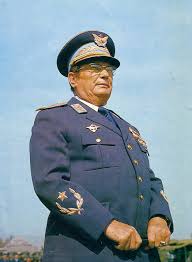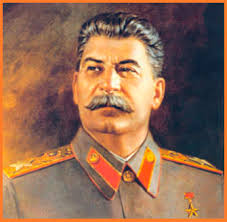YUGOSLAVIA – Helpful links for our assignments
The film When Father Was Away on Business takes place in what is known as the Informbiro Period (Cominform) in Yugoslavia –the years between 1948 and 1955 that were characterized by the schism between Tito/Yugoslavia and Stalin/USSR. For details on Cominform, see Fred Singleton (220-221)
THE COMINFORM DISPUTE and the TITO-STALIN BREAK :


September 1947: The Cominform (or Communist Information Bureau) established as an organization to coordinate information exchange and consultation of member parties. Members included USSR, six ruling eastern European parties, the French, and the Italians.
Although to the outside world Tito appeared to be second to Stalin in world Communist hierarchy, there were serious tensions developing as soon as 1946. The Yugoslavs had shown unwelcome signs of independence on several occasions during the war, but after being rebuked by Stalin these blunders seemed to have been forgiven by 1947. But for the rest of 1947 differences emerged between Yugoslav leaders and Soviet allies in economic, military, and foreign policy.
1948: By this time disagreements had begun over ideology and the whole basis of the Yugoslav Party’s policy, and the attitude of Yugoslavs towards Soviet advisers and diplomats. Stalin and Tito exchange a series of letters that become increasingly hostile. There were bitter arguments about territorial claims, class struggle in the countryside, and the role that the Red Army had played in the achievements of the Partisans in liberating Yugoslavia –Stalin insinuated that Yugoslavs were too proud of their victories over the Axis powers when, according to Stalin, the Red Army had saved Yugoslavia from destruction. (The Partisans had, actually, little assistance from the Soviets in this struggle)
see here for an article on the split: http://muse.jhu.edu/login?uri=/journals/journal_of_cold_war_studies/v009/9.2perovic.html and see here for the CIA perspective on the split: http://www.lib.ncsu.edu/theses/available/etd-07252005-215605/unrestricted/etd.pdf
May 1948: Two leading Communists in Yugoslavia arrested, accused of being Soviet agents.
June 1948: Yugoslavs summoned to a Cominform meeting, but Yugoslavs refused to attend what they suspected might be a form of show trial.
June 28 1948: Yugoslavia expelled from the Cominform. The world was shocked. After the expulsion, Tito suppressed those who supported the resolution, calling them “Cominformists.” Many members defected.
Many party members found it impossible to abandon the pro-Soviet attitudes which had been drilled into them during the previous decade, and many were imprisoned. Aleksandar “Leka” Ranković was head of the Yugoslav secret police, or State Security Administration (UDBA)
_________________________________________________________________________________________________________
GOLI OTOK – PRISON CAMP

Monument to Victims of Goli Otok
At first conditions were unbearably harsh, but later protests by liberal-minded party members eventually resulted in an amelioration of the regime (see Singleton, 222) (meanwhile, The other socialist states of Eastern Europe subsequently underwent purges of alleged “Titoists”[4]. Titoism was associated with the position that countries should take a nationalist road to socialism different from that of the Soviet Union.)
_______________________________________________________________________________________________________________________________________
Our film WHEN FATHER WAS AWAY ON BUSINESS takes place during this period.
See the following 1985 review of the film by Henry Kamm in the New York Times.
Excerpts from the review WINNER FROM THE BALKANS (NYT 11/24/1985 p. 21):
“Mr. Kusturica’s euphemistically titled film – father’s business trip was a two-year term in a labor camp – is set in the period following Yugoslavia’s break with the Soviet Union in 1948. During a time of mass arrests of those suspected of Stalinism, many others were arbitrarily swallowed up by the camps. The film’s father, a petty state employee and womanizer, was one of them. Mr. Kusturica depicts the corrosion of the life of a tightly knit, traditional Sarajevo family in a period when politics penetrated all aspects of life, including the privacy of family, lovers and friends.

E. Kusturica
The film’s events are viewed through the cruelly candid eyes of a clearsighted 6-year-old boy, played by Moreno D’E Bartolli, who misses nothing and retains his sanity and courage through mordant mockery and flights into sleepwalking. In an ending that suggests utter despair at the prospects for goodness and justice on earth, the somnambulist levitates and floats skyward.
[…]
Politics played only a minor part in his fund-raising difficulties, Mr. Kusturica said. It is true that the manager of a local film company bowed out of sharing production costs because he was afraid of the script’s political implications. But Mr. Kusturica refuses to blame Yugoslavia’s Communist, though nonaligned, political system.
”It reminds me of the Western situation,” he said. ”You bring a script to a moneyman who thinks the film won’t make enough money. He would refuse it.” There are, indeed, few taboos in discussing this country’s past other than the still untouchable stature of the late President Marshal Tito.
Although Mr. Kusturica disclosed that he, like the film’s main character, sleepwalked as a child and that his father is a state official and Communist Party member – unlike his mother and himself – he rejected a suggestion that the film’s story contained autobiographical elements. Nor does he consider his film political. He and his script writer, Abdulah Sidran, first saw it largely as the story of the mother, a victim both of her husband’s unfaithfulness and the price he paid for it – denunciation by his mistress and imprisonment. The boy took over as the film’s focus only as work progressed.
”My point of view had been hiding very deep inside me,” the director explained. ”It stems from a bitterness at what I see in the world as a whole, not specifically in this system.”
Although he admits to bitterness, Mr. Kusturica rejects the word pessimism to describe his outlook, perhaps because in countries of Marxist ideology, no matter how unauthoritarian, it connotes an attitude too openly contrary to the optimism that is a citizen’s duty. Mr. Kusturica calls himself a skeptic. ”I think peering deeply into the soul of any person would not reflect favorably on the system in which he lives,” he said. ”Even a big hero is also a great loser.”
Mr. Kusturica describes himself as having the same disabused view of all countries of the world. His skepticism extends also to the United States, which he recently visited on a six-week tour arranged by the United States Information Agency. ”I saw a huge and powerful country,” he said. ”In California I saw beautiful houses, but the people do not have time to live in them.”
[..]
____________________________________________________________________________________________________________________________________
DISSENT IN YUGOSLAVIA
Part of the reason that dissent in Yugoslavia took such a different form is that artistic works were simply not censored to the degree that works were censored in other East European Communist countries.
Miroslav Krleža (1893-1981) was among Yugoslavia’s most prolific writers. He became a close ally of Tito after Yugoslavia’s break with Stalin. In 1952, Krleza delivered a famous speech at a writer’s conference in Ljubljana. In it, he attacked social realism and Stalinist aesthetics and the result was the strengthening of his following among the younger Yugoslavian artists. Krleza’s speech is considered to be the formal Yugoslav abandonment of Socialist Realism as state-promoted aesthetics. (see here and here for more)

______________________________________________________________________________________________________________________________________
The two most prominent dissidents in Yugoslavia: Mihajlo Mihajlov and Milovan Djilas
Milovan Djilas:
“Djilas was born in Montenegro in 1911. He rose to prominence in the Yugoslav Communist world. After 1948, he began traveling abroad and was impressed with Western social democracy, especially with the Continental Socialists and the British Labor Party. During 1953 and 1954 he published a series of essays in Borba, the chief Yugoslav party paper, in which he argued that Yugoslavia’s class struggle was over, that the enemy was no longer capitalism but the party bureaucracy, that the bureaucrats were blocking progress by preventing freedom of expression, and that all forms of despotism must be abandoned. A stormy debate followed. Djilas resigned his membership in the Communist party. He was arrested in 1955 and released on probation, but he continued to write for foreign newspapers and journals. In 1956, lie was sentenced to three years in prison for criticizing Yugoslav policy on the Hungarian revolution. In 1957, after publication of The New Class, from which the following selection has been taken, he was sentenced to an additional seven years in prison for “deliberate intent to compromise both socialists as art idea and the international worker’s movement,” and “seeking to undermine the peoples’ authority, defense and economic power” Djilas was released on probation January 21, 1961.” (This short bio taken from this site, where you can find samples of his writings: http://www.cooper.edu/humanities/core/hss3/m_djilas.htm)
 For a really interesting resource on Djilas, use a browser like Chrome that has an automatic translator feature, and check out this site – great photos and a lot of info on Djilas: http://milovandjilas.rs/hronologija.html
For a really interesting resource on Djilas, use a browser like Chrome that has an automatic translator feature, and check out this site – great photos and a lot of info on Djilas: http://milovandjilas.rs/hronologija.html
Also see here for more info on Djilas and excerpts: http://www.spartacus.schoolnet.co.uk/COLDdjilas.htm
Mihajlo Mihajlov:
See here for a short bio of Mihajlov: http://richbyrne.blogspot.com/2010/03/mihajlo-mihajlov-1934-2010.html


Check out these contributions of Mihajlov’s: Yugoslav Dissidents Help the Poles
Read his book online for free: Underground Notes http://www.archive.org/details/undergroundnote00mihagoog
A nice tribute to Mihaijlov: http://richbyrne.blogspot.com/2010/03/mihajlo-mihajlov-1934-2010.html
_________________________________________________________________________________________________________________________
Danilo Kis – A Tomb For Boris Davidovich: A Literary Scandal
http://hubpages.com/hub/Danilo-Kis–A-Tomb-For-Boris-Davidovich-A-Literary-Scandal
Click on the above link or image to see a website on Kis.=
_________________________________________________________________________________________________________________________
B-92 is still on the air! http://www.b92.net/eng/
And it has special coverage of Karadzic’s trial: http://www.balkaninsight.com/?tpl=897
Who is Karadzic? see here: http://www.nytimes.com/info/radovan-karadzic/







